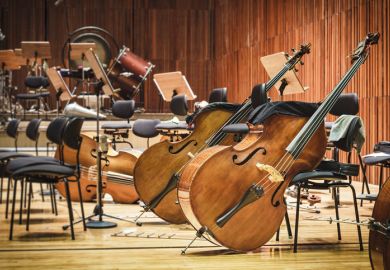The ceremony for the 2001 Mercury Music Prize took place on the night of September 11. Some commentators suggested that given the tragic circumstances, it was inappropriate to be staging such an event. But in awarding the prize (to PJ Harvey), the chair of the judging panel, Simon Frith, argued that, rather than seeing music as an irrelevance, it was at times like this that music mattered most.
One might be forgiven for thinking that a book titled Music in the Post- 9/11 World would reflect such sentiments, or at least debate them, but sadly this is not the case.
Instead, the editors have compiled a rather odd collection of pieces, all of which make some reference to music and 9/11 but do not make any very sustained contribution to the book's apparent theme.
Rather, we get an uneven mix of the fascinating and banal, in which many aspects of music are discussed, but none of which tells us much about how it has changed since 9/11, or indeed how such events might be expected to impact on cultural expression.
One notable exception is a chapter by Martin Scherzinger on music censorship after 9/11. His focus is on the decision by Clear Channel Radio to instruct its 1,000 or so US stations not to play certain songs (The Clash's Rock the Casbah , The Bangles's Walk like an Egyptian , Phil Collins's In the Air Tonight and Louis Armstrong's What a Wonderful World , among 160 others).
But rather than simply mocking Clear Channel, Scherzinger instead offers a nuanced discussion of the idea of censorship and the extent to which it may be exercised through the market practices of media organisations. He connects this to the treatment of the Dixie Chicks, who, after casually criticising President George W. Bush from a London stage in 2003, found themselves shunned by radio stations back home in the US.
Scherzinger notes that censorship does indeed occur "within a highly concentrated marketplace", as well as through the acts of a government, but adds that a particularly lethal censorship emerges when commercial and federal interests are connected. Clear Channel had especially close links with Bush and the Republican Party.
While other chapters in the first part of this collection provide useful chronicles of the shifting terrain of political pop and rock, or careful analyses of the way music was used to frame popular and official mourning, they do not provide the sharp focus and reflection of Scherzinger's contribution.
However, there is another novel feature to the book: a second part in which the focus on the US (and Canada) of part one is replaced by a broader perspective. Here there are accounts of musicians in the Peruvian Andes reflecting on 9/11 and American power, and of post-9/11 music in Mexico, Africa and the Middle East. But here again there is little detailed engagement with questions of how and why music and musicians connect with events in the wider world.
Veronica Doubleday's account of music-making in Afghanistan is the exception. Written against the Taleban's well-known, if not always well- understood, banning of music, Doubleday reveals how musicians negotiated their peculiar circumstances and draws attention to the particular difficulties that continue to be faced by women. She tells of a 24-year- old television presenter who was murdered because she fronted a "racy" MTV-style television programme.
Such stories reinforce our sense of how music matters and the strange and frightening ways in which this can be expressed. This book goes some way to opening up such issues, but it might have gone much further.
John Street is a professor of politics at the University of East Anglia.
Music in the Post-9/11 World: Jonathan Ritter and J. Martin Daughtry
Publisher - Routledge
Pages - 360
Price - £15.99
ISBN - 9780415978071
Register to continue
Why register?
- Registration is free and only takes a moment
- Once registered, you can read 3 articles a month
- Sign up for our newsletter
Subscribe
Or subscribe for unlimited access to:
- Unlimited access to news, views, insights & reviews
- Digital editions
- Digital access to THE’s university and college rankings analysis
Already registered or a current subscriber?



